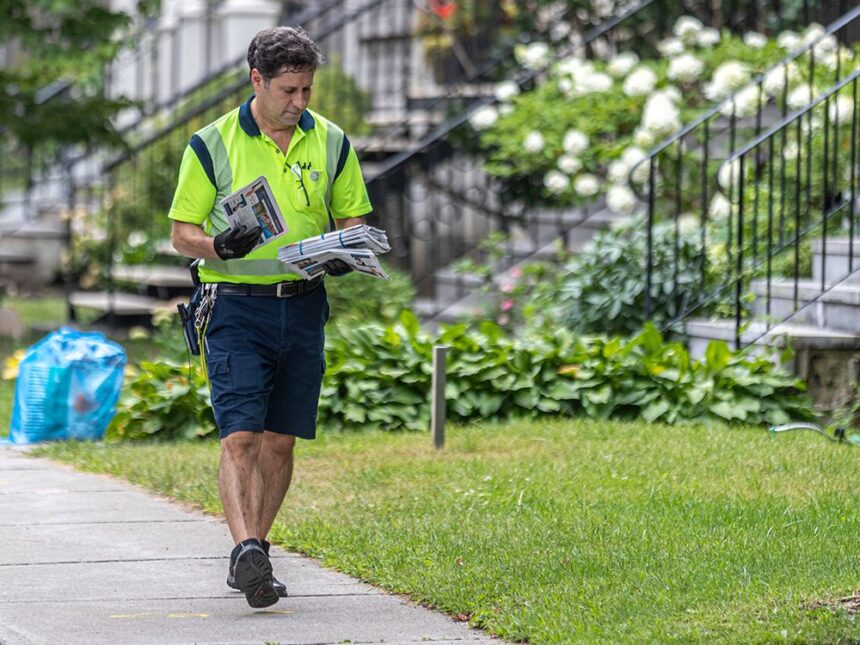The bustling operations of Canada Post ground to a partial halt this weekend as thousands of postal workers launched targeted job action, refusing weekend shifts in a dramatic escalation of ongoing labour tensions. This strategic move by the Canadian Union of Postal Workers (CUPW) represents the first significant disruption in postal services since negotiations between the union and Canada Post management reached an impasse earlier this month.
“We’re not taking this action lightly,” said Jan Simpson, CUPW National President, speaking from the picket line outside Toronto’s main sorting facility. “After months of good-faith negotiations, management continues to push proposals that would erode job security and working conditions that our members have fought decades to secure.”
The weekend work stoppage affects sorting facilities across major urban centers including Toronto, Montreal, and Vancouver, potentially delaying millions of parcels and letters scheduled for Monday delivery. This job action specifically targets Canada Post’s growing weekend operations, which have expanded significantly as the Crown corporation attempts to compete with private courier services in the e-commerce delivery market.
According to Canada News sources within Canada Post, the corporation has been preparing contingency plans, including possible deployment of management personnel to critical sorting positions. However, industry experts suggest these measures will prove insufficient to prevent delivery delays that could stretch well into next week.
At the heart of the dispute lies Canada Post’s proposal to establish a separate workforce for weekend operations—a move CUPW claims would create a “two-tier” employment system with reduced benefits and job security for new hires. The union is instead pushing for premium pay for existing employees who take weekend shifts, along with improvements to the pension plan and better protections against increasing workloads.
“The volume of parcels has exploded since the pandemic, but staffing hasn’t kept pace,” explained Derek Richmond, a 15-year postal worker from Hamilton. “Some of us are handling nearly twice the packages we did five years ago, with no adjustment to delivery routes or time allocations.”
Canada Post spokesperson Eleanor McAteer characterized the job action as “unfortunate and unnecessary” in a statement released Saturday morning. “We’ve presented a fair and balanced proposal that addresses the union’s core concerns while ensuring Canada Post remains financially sustainable in a highly competitive delivery market,” McAteer stated. The corporation reports operating losses of $548 million in the last fiscal year, despite parcel volume growth.
Labour relations experts following the dispute note that the timing is particularly challenging for Canada Post, as CO24 Business analysts report the service is entering its pre-holiday ramp-up period. E-commerce retailers typically begin increasing shipments in October, preparing for Black Friday and the December shopping season.
“This limited job action is strategically designed to maximize pressure on management while minimizing impact on the Canadian public,” said Alicia Torres, labour relations professor at York University. “It’s a calculated escalation that signals the union’s willingness to consider more extensive measures if meaningful progress isn’t made at the bargaining table.”
The federal government, which oversees the Crown corporation, has thus far maintained a hands-off approach. Labour Minister Steven MacKinnon issued a brief statement encouraging both parties to “continue negotiating in good faith toward a resolution that ensures reliable postal service for Canadians.”
Previous labour disputes at Canada Post have occasionally resulted in back-to-work legislation, including during the 2018 rotating strikes. However, CO24 Politics correspondents note that the current Liberal government appears reluctant to intervene at this early stage, particularly given its minority position in Parliament and traditional alliance with labour interests.
Small businesses, especially those dependent on weekend shipments, are expressing increasing concern. “We ship perishable products that can’t sit in warehouses,” said Marie Levesque, owner of a Montreal-based artisanal food company. “Even a day’s delay can mean significant losses and disappointed customers.”
As both sides prepare to return to the negotiating table on Monday, the question remains: will this limited job action be enough to break the impasse, or are Canadians about to witness the first full-scale postal disruption in years during the crucial pre-holiday season?










